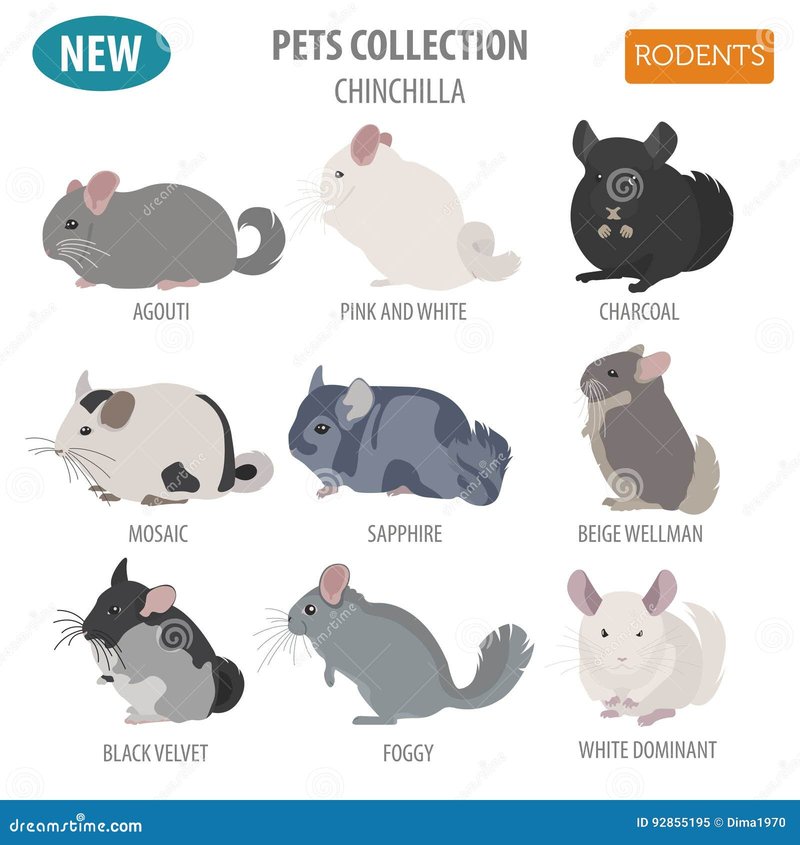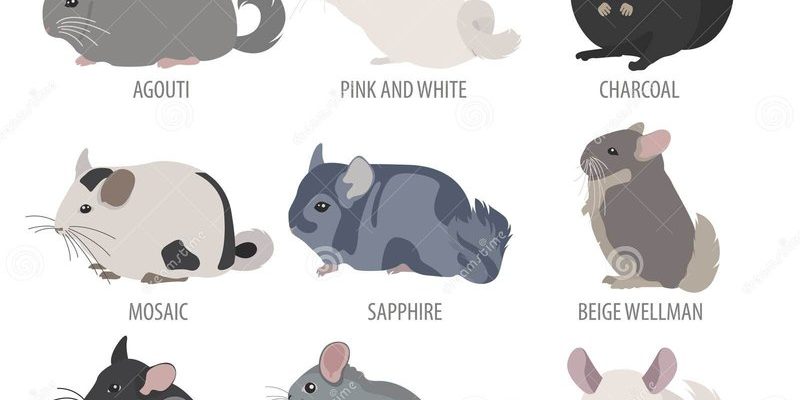
So, what makes charcoal chinchillas so special? Well, these little critters are not just cute; they’re a product of meticulous breeding practices and specific genetic traits. Just like in any breeding program, knowing how genetics work can help breeders produce not just healthy animals but also those that meet distinct criteria, such as color and temperament. Let’s dig deeper into what makes these chinchillas tick!
What Are Charcoal Chinchillas?
Charcoal chinchillas are a distinct color variety that results from a specific genetic mutation. Unlike the standard gray or beige chinchillas we often see, charcoal chinchillas have a beautiful black-gray coat that can sometimes appear iridescent under the right lighting. This unique coloration is due to a recessive gene that can be challenging but rewarding to breed.
If you’re considering adding a charcoal chinchilla to your family, you might be wondering how their coloring develops. The charcoal color comes from a dilution of the usual pigmentation found in chinchillas. Unlike regular chinchillas, which rely on dominant genes, charcoals specifically need two copies of the recessive gene to display their gorgeous fur. This means breeding them can be a careful balancing act, ensuring that the right genetic combinations come together.
Let’s also touch on the temperament of charcoal chinchillas. Many owners find that, regardless of color, these little furballs have delightful personalities. They’re curious, playful, and full of energy, making them a hit with families and individuals alike. Their charm is not just skin-deep!
Understanding Genetics in Breeding
When breeding charcoal chinchillas, understanding basic genetics is key. You could think of genetics like a recipe: each ingredient contributes to the final dish. In this case, the “ingredients” are the genes passed down from parent chinchillas.
The breeding process involves selecting chinchillas that have the desired traits, such as color and health, and ensuring they don’t carry recessive genes that could lead to health problems. Here’s a quick breakdown of how this works:
- Dominant Genes: These are genes that will express themselves even if only one parent has them.
- Recessive Genes: These only express when both parents carry them, like the charcoal coloration.
- Genotype: This is the genetic makeup of the chinchilla, determining traits like color.
- Phenotype: This is the observable physical characteristics, like the beautiful charcoal fur!
By understanding these terms, breeders can make informed decisions about which pairs to bring together. It’s like being a scientist in a lab, where each breeding can yield surprises, some good and some not so much.
The Breeding Process of Charcoal Chinchillas
Breeding charcoal chinchillas can be rewarding, but it requires careful planning. Here’s what the process generally looks like:
1. Selecting Parent Chinchillas: Start with healthy chinchillas that have the desired traits. This means not just looking for color but also checking for good health and temperament.
2. Genetic Testing: Before breeding, conduct genetic tests to check for any undesirable recessive genes. This is crucial to reduce the risk of health issues in the offspring.
3. Monitoring Pregnancies: Once breeding occurs, it’s important to monitor the female chinchilla (called a doe) closely, as she will go through a pregnancy lasting about 110 days. Providing a stress-free, nutritious environment is key during this time.
4. Caring for the Kit: After a successful birth, the kits (baby chinchillas) will need special care to ensure they grow up healthy. Proper nutrition and a safe, clean space are essential.
This careful process might seem complicated, but with patience and dedication, breeders can help produce adorable and genetically sound charcoal chinchillas.
Health Considerations in Breeding
Health is a top priority when breeding any animal, and chinchillas are no exception. Charcoal chinchillas, like all chinchillas, can be prone to specific genetic health issues that breeders should be aware of. Some of the common health concerns include:
- Dental Problems: Chinchillas have continuously growing teeth, which need to be worn down naturally through chewing. If they’re not careful, malocclusion can occur.
- Respiratory Issues: Chinchillas are sensitive to humidity and heat, so maintaining a cool, dry environment is crucial.
- Digestive Problems: A fiber-rich diet is essential for their digestive health. Pellets and hay should be the staples in their diet.
By prioritizing health in breeding practices, owners can reduce the risk of passing on genetic conditions and ensure that their chinchillas live long, happy lives. Regular check-ups from a veterinarian familiar with chinchillas are also a great idea.
The Importance of Lineage Documentation
When breeding charcoal chinchillas, keeping detailed records of lineage is vital. It’s like having a family tree that shows where every chinchilla fits in. This documentation helps breeders track genetic traits, health history, and any potential issues that might arise.
Good record-keeping can also assist in making breeding decisions. For example, if a particular pairing consistently produces healthy kits, it might be wise to repeat that pairing in the future. Conversely, if issues arise, the breeder can avoid similar pairings.
Additionally, having well-documented lineage can provide peace of mind for potential buyers. They’ll feel confident knowing they’re getting a chinchilla with a good genetic background, which can lead to better health and temperament.
Ethical Breeding Practices
Ethics in breeding is crucial, especially for animals like chinchillas that rely heavily on human care. As a responsible breeder, it’s essential to prioritize the well-being of the animals above all else. Here are some key ethical considerations:
1. Avoid Inbreeding: Inbreeding can lead to severe health problems. It’s best to mix genes to create a healthier gene pool.
2. Provide Lifelong Support: If you sell a chinchilla, be prepared to offer support to buyers in case they have questions or concerns. You want to ensure your chinchillas are well cared for throughout their lives.
3. Educate Others: Share knowledge about chinchilla care and the importance of responsible breeding with potential owners. The more people know, the better care chinchillas will receive.
By following ethical breeding practices, you help create a positive environment for chinchillas and their owners, ensuring a brighter future for this charming species.
Breeding charcoal chinchillas is an enriching experience that combines science with a bit of artistry. As you navigate through genetics, health considerations, and ethical practices, you’re building not just a lineage of beautiful pets but also a community of chinchilla lovers. Remember, every little chinchilla has its own personality and quirks, making the breeding journey a unique adventure.
So, whether you’re a seasoned breeder or just curious about these amazing animals, embracing the beauty of charcoal chinchillas can lead to both joy and fulfillment. Happy breeding, and may your journey be filled with fluffy, delightful companions!

